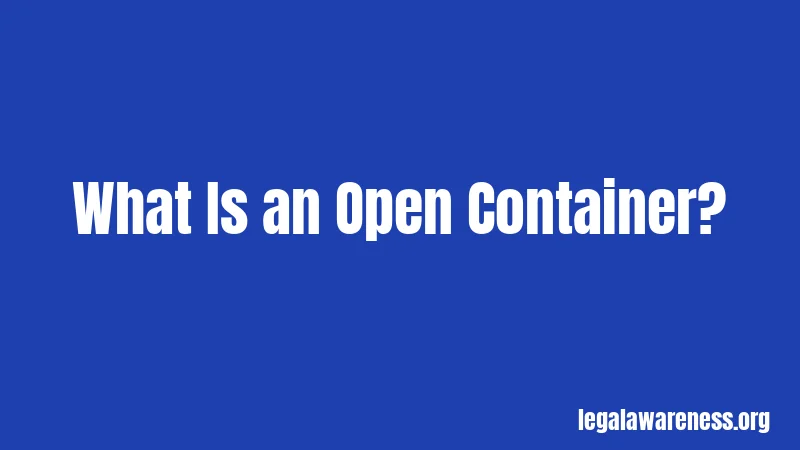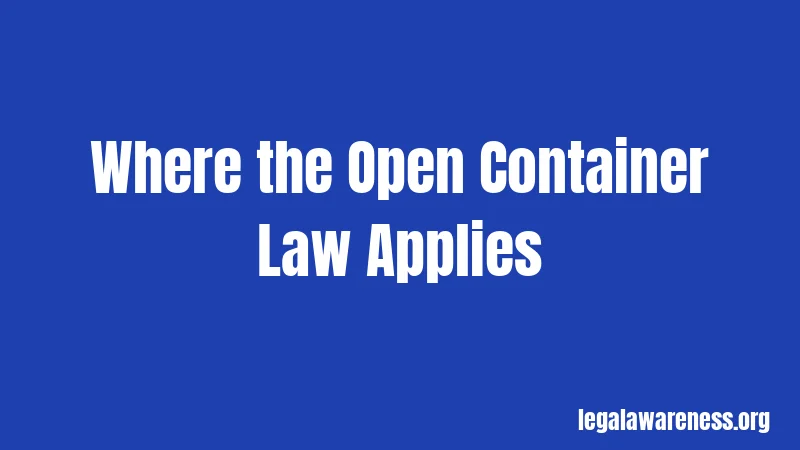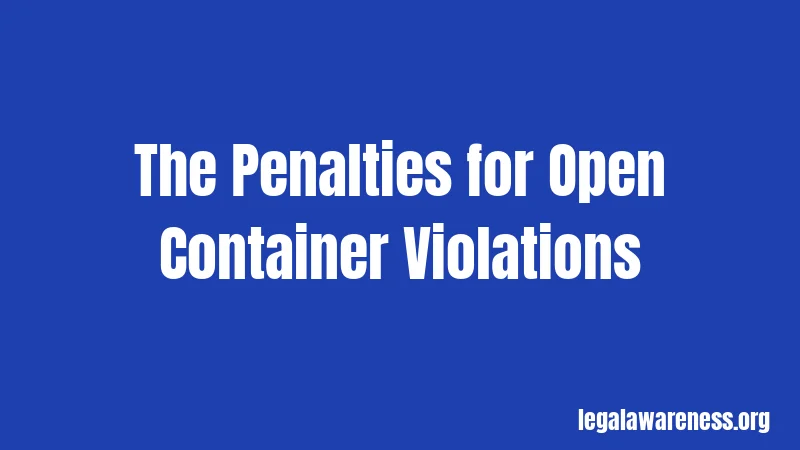Illinois Open Container Laws (2026): Breaking Down What’s Illegal
Most people think open container laws are pretty simple. You drink in your car, you get in trouble. But honestly, the actual rules in Illinois are way more specific than that. And the penalties? They can surprise you.
Here’s the thing: Illinois takes open containers seriously. The state has clear laws about where alcohol can be. Break them, and you’re facing real consequences. Let’s walk through exactly what you need to know.
What Is an Open Container?

An open container is any alcoholic drink that’s been opened, partially empty, or ready to drink. Think of it like this: if the cap is off, the lid is up, or someone already took a sip, it’s open.
Pretty straightforward, right? It’s basically any alcohol that isn’t sealed in its original packaging.
The Basic Rule
Here’s where it gets important. You cannot have an open container of alcohol in your vehicle. That’s the main law. Not in the front seat. Not in the back seat. Not even in the trunk.
Wondering if this applies to passengers too? Yep. It applies to everyone in the car. The driver and any passengers cannot have open alcohol.
Where the Open Container Law Applies

The open container ban covers your whole vehicle. That means the passenger compartment and the area that passengers can reach. Your trunk is actually safer. Technically, an open container in the trunk doesn’t violate the open container law. But storing it there isn’t the best move either.
What about your porch or yard? You’re fine there. The law only applies while the vehicle is on a public road or highway. If you’re parked on private property, like your driveway or a parking lot, the law might not apply. But stay with me here: laws get tricky with parking lots. If the parking lot is open to the public, you could still get ticketed.
What Counts as a Vehicle?
You might think this only applies to cars. Think again. The law covers any motor vehicle. That means cars, trucks, vans, motorcycles, RVs, and SUVs all count.
What about golf carts or ATVs on private property? Different rules apply. We’ll get into that soon.
The Penalties for Open Container Violations

Okay, this is where things get serious. Let’s talk about what actually happens if you get caught.
First offense for an open container violation? You’re looking at a fine. In Illinois, the fine can be up to $500 for a first offense. That’s a real hit to your wallet. Some judges might go lower, but $500 is the maximum.
You could also get a criminal charge on your record. This matters more than people realize. A conviction can affect job applications, housing situations, and other legal matters.
Second offense? Here’s where it gets worse. The fines go up. You might face fines up to $1,000. Plus, there’s a chance of jail time. We’re talking up to 30 days in jail. Honestly, that’s serious.
Third or later offense? The penalties increase even more. Fines can reach $1,500. Jail time can extend up to 6 months. This is no longer a small mistake. This is a real criminal conviction.
Driver’s License Suspension
Hold on, it gets more complicated. An open container conviction can also affect your driver’s license. You might face license suspension. Illinois doesn’t automatically suspend your license for this, but the court might order it. Plus, your insurance rates will jump. Significantly.
Special Circumstances
Not sure what counts as a violation? Let me break it down.
An open beer can in the cup holder is a violation. An open wine bottle in the back seat is a violation. Even a partially empty mixed drink counts.
What about a sealed bottle that someone opened but recapped? Still a violation if anyone could potentially drink from it.
Now, here’s a special case: What if you’re the passenger, not the driver? You can still get ticketed. Both passengers and drivers face the same law. Both can be arrested and charged.
Containers in the Back Seat
Wait, does it matter where exactly the open container is? Honestly, not really. Many people assume the back seat is fine as long as they’re not the driver. That’s wrong. The law applies to any open container within reach of passengers.
The safest bet? Keep all open alcohol sealed and put in the trunk. Or don’t drink in the car at all. Pretty simple.
What About Open Container at Home or on Your Porch?
This one’s important. Illinois open container laws only apply to vehicles. If you’re at home, having open alcohol is totally fine. On your porch? Also legal. At a park, picnic table, or any other location outside a vehicle? The open container law doesn’t apply.
This is actually one of the biggest misconceptions. People think they can’t have open drinks anywhere. That’s not true. The law is specific to vehicles. Outside vehicles, you’re free to have open containers in places where alcohol is allowed.
Crossing State Lines
Here’s something that surprises people. If you’re traveling across state lines, you need to know: different states have different open container laws. What’s legal in Wisconsin might be illegal in Illinois. Some states have no open container law at all.
If you’re driving through Illinois from another state, Illinois law applies. You could get ticketed for something that was legal where you started. Stay informed about the state you’re entering.
Exceptions and Special Cases
Okay, pause. This is where exceptions come in. Are there any situations where open containers are allowed in your vehicle?
Actually, there’s one major exception. Rideshare vehicles like Uber or Lyft have different rules. Passengers in a rideshare can legally have open containers in certain situations. The rideshare driver, though, still cannot.
Taxis also have different rules. Check with your specific taxi company, but generally, passengers in taxis have more leeway than regular drivers and passengers.
How to Avoid Getting Ticketed
Let me give you practical guidance here. First, keep all open alcohol in your trunk. Not the back seat. Not the front seat. The trunk.
Second, seal anything that’s open. Recap bottles and cans completely. If someone started drinking something, finish it or throw it away before getting in the car.
Third, if you’re driving passengers, remind them of the rule. You’re responsible for your vehicle. If a passenger has an open container and you don’t do anything about it, you could also get in trouble.
Want to travel with sealed alcohol? That’s totally legal. Unopened beer, wine, or liquor in sealed containers is fine anywhere in your car. The law only applies to open containers.
What If You Get Pulled Over?
You’re not alone in this situation. Many people end up dealing with traffic stops. Here’s what you should know.
If a police officer stops you and sees an open container, be honest and polite. Cooperation helps. You might still get ticketed, but attitude matters in how an officer handles the situation.
Ask if you can move items from the trunk to avoid giving permission to search your vehicle. Keep your hands visible. Don’t argue or act defensive.
If you get ticketed, you have options. You can pay the fine, appear in court, or work with a lawyer. Don’t just ignore the ticket. That makes things worse.
Recent Changes to Illinois Law
I looked this up recently. Illinois hasn’t made major changes to open container laws in the last few years. The law that exists now has been in place for a while. But penalties and how they’re enforced can change, so it’s worth staying aware.
If you want the absolute latest information, contact an Illinois lawyer or check the Illinois Secretary of State website.
Frequently Asked Questions
Is it illegal to have an open container in my car trunk? Technically, the open container law doesn’t apply to trunk storage. But it’s still not the smartest idea. If the trunk is open or damaged, or if the container spills, you could have a mess and potential legal issues.
Can I drink alcohol while parked in my car? No. Your car doesn’t have to be moving. If an open container is in your vehicle while it’s parked on a public road, you can be ticketed. Private property is different, but public roads or accessible parking areas are risky.
What if I’m sitting in my car in my driveway drinking? If you’re on your own private property, you’re generally fine. But if your driveway is visible from the street or if the parking area is technically public, you could still get ticketed. Stay on truly private property to be safe.
Does the law apply to passenger medications or medical alcohol? Medical exceptions exist in some states, but Illinois is strict about this. Technically, even medicinal alcohol could cause issues if it’s open. Ask your doctor or pharmacist for guidance if this applies to you.
What counts as being “in the vehicle”? If you’re in the driver’s seat, passenger seat, or anywhere in the main compartment, you’re in the vehicle. The trunk is separate, which is why it’s treated differently. Being in the backseat still counts as being in the vehicle for the purposes of this law.
Final Thoughts
Now you know the basics of Illinois open container laws. The main rule is simple: keep alcohol sealed or in your trunk while driving. The consequences for breaking this law are real and can affect your record, your wallet, and your insurance rates.
Most importantly? This law is easy to follow. Don’t open drinks in the car. Have passengers avoid it too. Problem solved.
If you’re ever unsure about a specific situation, ask a lawyer. They can give you advice based on your exact circumstances. When in doubt, it’s better to be safe than sorry.
References
Illinois Criminal Code: Open Container Law
Illinois Secretary of State: Driver Services
Illinois Vehicle Code: Rules of the Road
